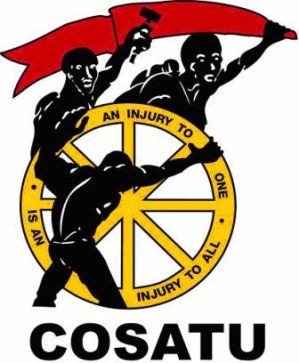New Orleans Several years ago the Organizers’ Forum (www.organizersforum.org) took a delegation of community and labor organizers to Johannesburg and Cape Town, South Africa, for a series of fascinating meetings with community based organizations and unions. We were there at the 10th anniversary of liberation and were fascinated by the three-legged stool that formed the basis for power in the country: the ANC, the South African Communist Party, and COSATU.
COSATU is of course the Congress of South African Trade Unions, which was an important force in the fight for freedom in the country and also continues to be that rarity in the global labor movement — a large dominant federation with extensive membership and density. COATSU claims at this point 1.8 million members. Even though it is virtually a part of government and certainly of the current governing consensus, COSATU is still self-described as a “revolutionary” trade union movement.
When met a number of their leaders and sat through a training and discussion period with the organizing staff from several of the COSATU affiliates and were impressed. We spent a lot of time discussing strategies for organizing informal workers, which plagues COSATU as well.
I was reminded of all of this the other day when reading a piece in the Wall Street Journal about the debate inside COSATU over how much to press the illegitimate regime of President Robert Mugabe of Zimbabwe. The world was heartened several months ago when the port worker affiliate of COSATU refused to unload a shipload of arms bound for Zimbabwe from China. Other African countries and their unions then joined in refusing the ship safe harbor, and it ended up being forced to sail back to China. Zimbabwe is land-locked, so actions of this kind are a rare combustion of worker and political power.
This may be one of the rare unions in the world where one can imagine the fierceness and passion of the internal debate now that COSATU has publicly denounced the Mugabe regime about whether to go with the left-wing of the union and push for a total blockade of all ports of entry through South Africa or keep their powder dry because of fears that the population would be adversely impacted by such a boycott. It is not a simple question since there was a rounding up and clear retribution of beleaguered union leaders in Zimbabwe as a counterattack to the earlier COSATU action.
In other countries and other labor movements there might be a caucus, perhaps a petition, maybe one of the activists or stewards might rise to be recognized and speak on this issue from the floor, but labor focuses less on guns and more on butter, as Gompers used to instruct in the early days of the AFL. This will be a passionate debate and when the talk is over, COSATU will act, that I can promise. Perhaps they will not act in as sweeping a manner as their own internal caucus might want, but at least they will act in some clear and decisive way. COSATU will not stand to the side or be pushed out of the general debate about what to do with this neighbor country where they have close ties. They will be in the heart of the fray, and whatever they decide to do next; they will be ready to go farther if that doesn’t work.
That’s a prediction, I can make with some confidence based on our visit, and its part of what makes COSATU one of the model labor federations in the world today. We should be so lucky to have a COSATU in our future everywhere.
